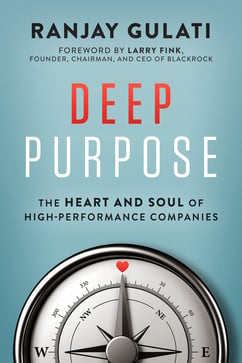MONTHLY NEWSLETTER:
Subscribe and join our community of curious HR Professionals and Managers.
Latest Article
Categories
Quick Links
Applauz Blog
Published: April 26, 2022
Last Updated: May 29, 2022
9 min read
By: Michelle Cadieux

In this edition of Applauz Book Club, we read Deep Purpose by Ranjay Gulati and learn about the heart and soul of high performing companies.
📖Applauz Book Club is a series that outlines noteworthy ideas from popular books on the topics of work, HR strategy, and management. To see last month’s Applauz Book Club article, click here.
Developing "meaning" and "purpose" is often touted as an essential strategy for building strong work cultures. But very few articles explain how companies can cultivate greater purpose.
As a result, for most businesses, "purpose" and "meaning" wind up being nothing more than a few buzzy words on a company's website.
In this 2022 book, Harvard Business School professor Ranjay Gulati unpacks the concept of deep purpose. His research not only explains what purpose really is but also how companies can cultivate greater purpose and meaning.
Many companies get purpose wrong. That’s because they misunderstand the goal of "purpose" in the workplace, explains Ranjay.
They use purpose as a "promotional vehicle to make themselves feel virtuous and look good to the outside world." or they simply confuse the idea of purpose with a "mission statement" or "core values."
Ranjay says that purpose is not just a catchy phrase that motivates employees, but it's an idea that transcends the workplace; it touches every aspect of a company.
Having a purpose isn't just talk; it gives leaders direction and guardrails to keep them on track.
As a result, having a solid purpose can help leaders make better, strategic decisions that lead to effective growth and business progress.
But why is purpose so important? Because times have changed.

In light of the Great Resignation, it is evident that employees need more than pay to feel good about work; they also need to belong. They want to have a sense of motivation beyond earning money. Customers, too, are looking not just for products that meet a single need but also to associate themselves with businesses driving social good.
When your company is "high purpose," it means your business viability and existence go beyond just profits.
Through an inside look at the world's most purposeful companies, Deep Purpose reveals how business leaders can get their companies there.
As always, the goal of our Book Club articles is not to summarize the entire book - this one was long! Instead, we provide an overview of the most important takeaways.
In this article, we will highlight the main insights from the following chapters:
This book is for entrepreneurs and business leaders who want to learn how to practice deep purpose and drive long-term success for their companies. If you're interested in reading the entire thing, you can find it on Amazon here.

"Purpose" is a hot buzzword in business and work. But many leaders approach purpose superficially, as a "tool" or "instrument" the business can use to enhance its brand and its reputation quickly.
Ranjay describes this common approach as practicing "convenient purpose."
At worst, convenient purpose looks like companies exploiting social goods for nefarious ends, such as in the case of CEO Elizabeth Holmes and Theranos.
At best, convenient purpose firms practice "purpose as win-win," attempting to deliver value to both society and shareholders. But they will only do social good if they benefit financially.
Simply put, if there are no immediate financial benefits they will overlook social value in favour of the interest of shareholders, ultimately "aligning only a small position of their business with their purpose."
In contrast, leaders in "deep purpose" businesses "regard purpose more expansively." Purpose is not just a tool to meet an end goal; it's "an existential statement that defines the firm's very reason for being."
Purpose is about solving both "commercial" and "social" problems for all of a business's stakeholders. This includes shareholders but also employees, customers and the community at large.
To that end, deep purpose businesses are deliberate. As Ranjay says, a clear purpose should be influencing how people see and speak about decisions, products, processes, initiatives, and structures. It impacts everything.
In this chapter, Ranjay explains why many businesses don’t wind up developing deep purpose cultures: they are not motivated to pursue purpose unless they are gaining something immediately.
In short, these businesses seek to “chase an ideal of responsible business,” but they don't want to make any short-term compromises.
To Ranjay, tradeoffs are an unavoidable part of developing a long-term purpose.
In his research of deep purpose companies, he found that deep purpose leaders "negotiate stakeholder interest to arrive sometimes painful decision that stakeholder may or may not find good enough in the short term, but will eventually pay off for everyone."
In short, cultivating deep purpose is an exercise in "walking the razor's edge." It's about being willing to "linger in a space of discomfort, ambiguity, and contradiction" in the short term while being confident that it will be worthwhile in the long run.
To be clear, Ranjay recognizes how difficult this exercise can be for leaders. He states that "it requires tremendous courage" to convince investors to wait for eventual financial returns.
As such, Ranjay believes that deep purpose leaders must follow the three principles of practical idealism:
Ranjay closes by saying businesses should try and let go of the idea that "win-win solutions are the only ones that count." And he encourages leaders to think creatively about how they might act in ways that deliver as much benefit as possible to all parties involved.
We tend to think of purpose as a mission statement or a tool for motivating employees.
While this is true, Ranjay explains that deep purpose goes beyond the surface level and touches many layers of a business.
In this chapter, Ranjay explains the four distinct areas that purpose can impact. It's important to understand these categories as they can encourage leaders and help them to channel their efforts.
Deep purpose serves as a "north star." When looking to the future, "companies often struggle to select from numerous potential business models or technologies they might pursue." Purpose helps bring clarity to these decisions. Similarly, Jim Collins put forward the notion of a "hedgehog concept" in his book Good to Great. He also explains that when businesses are crystal clear on their goals, they can zoom in on the path they want to pursue; it paradoxically helps them go deeper within that path. Ultimately, this approach allows them to have more impact within that chosen area.
Deep purpose helps you maintain credibility and trust with external stakeholders and cultivate long-term relationships. In short, purpose lays the groundwork for partnerships. It facilitates collaborations through shared goals. It also helps companies "determine which firms to count on as partners." Ultimately, purpose can also enhance the quality of these business relationships by fostering trust and connection.
Consumers are more likely than ever to make buying decisions based on "the moral value" a company represents. Ranjay gives the example of Facebook, a company he claims is a prime example of practicing convenient purpose. He explains that Facebook's failure to live up to its purpose has "caused a broader erosion of its brand reputations among customers (advertisers) and the end-users of the platform." That's why developing a "strong reason for being" is key to forging deeper, lasting relationships with customers.
Lastly, deep purpose elevates work, allowing the company to motivate and inspire employees. Purpose "draws on our inherent human need to elevate ourselves by contributing to something bigger and more transcendent." Again, using Facebook as an example, Ranjay explains the consequences of practicing superficial purpose. Facebook was once considered one of the hottest tech companies to work for. Now they are struggling to recruit and keep employees on board. Ranjay affirms cultivating deep purpose helps drive the type of deep, intrinsic motivation that is critical to retaining employees.
Ranjay closes this chapter by asserting an interesting point.
He states to act on the four levers of purpose most effectively, "CEOs must become more comfortable speaking out as activists on key issues related to their purpose."
This should go beyond performative gestures but "speak out consistently, become personally involved in causes, and put money behind cause-related initiatives." Ranjay claims, "take powerful stands that matter given the purpose you and your company are pursuing."
According to Ranjay, a strong purpose comes from one important place – the past.
“You want to discover elements of the early business that, articulated in the form of a purpose statement, might continue to inspire, animate, and guide people toward the future, giving the organization meaning and a sense of having been chosen for an important mission."
He gives a detailed case study of Jorgen Knudstorp the former CEO of LEGO who helped invigorate a troubled company by “recommitting to a purpose rooted in the past.”
These leaders “recover the company's early energy or soul.” In doing so, they transform a company into not just an economic unit, but “a moral enterprise,” one that is united over a unique mission.
Developing a moral community is key to building a team that is strong and high-performing.
Moral communities bond over a shared belief system. In addition, they become close over their shared sense of commitment to the group and the larger cause. This affinity and trust is a powerful engine for driving employee engagement and ultimately propelling a business forward.
Ranjay states leaders can craft their purpose by also looking at past mistakes or failures. He affirms that such honesty doesn't erode a company's image. On the contrary, it humanizes the organization, creating stronger bonds between customers and the business.
A strong purpose brings people together. It creates a powerful group of like-minded people, all diligently working towards the same goal.
But is there room for the individual employee here? Absolutely.
In this chapter, Ranjay zooms in on the individual, explaining the importance of discovering and developing each employee's individual purpose.
This approach is critical to effective management, he explains. In essence, employees do not want to feel like they are a means to an end. People want to feel seen.
As such, when leaders focus too much on group purpose, they may overlook each individual's own purpose, thereby emotionally alienating their employees.
To activate deep purpose, companies must also show employees that they are valued as individuals by empathizing with them and regularly interacting with them.
Doing so genuinely makes people feel included and valued, which "fires up" internal motivation.
"It's very difficult for employees to engage fully with an organizational purpose–or, frankly, with anything related to their jobs–if they're holding back important parts of their identities or personalities."
Now, some leaders might scoff and think that the idea of "conversing intimately" with your colleagues or employees feels too touchy-feely. Business should not be this emotional.
Ranjay disagrees. According to his research on deep purpose companies, taking a "humanistic approach oriented to the needs of individual team members" can have tremendous long-term financial benefits.
According to him, when workers are allowed to express themselves, they will be more inspired and better at their jobs. They succeed not because the boss dangles a carrot before them but because their inner drive has been nurtured.
Centralizing power at the top and siloing information are both harmful effects of excessive bureaucracy, says Ranjay. And these rigid systems hurt people and businesses.
For example, he cites research that shows just how much money companies waste on "unnecessary bloat and busywork." He also tells of the bigger social costs pointing to the "Cobalt Crisis" at General Motors. In this tragic incident, innocent drivers died because a defective part was not recalled fast enough due to "entrenched corporate bureaucracy."
Many of the ideas presented here echo insight from the book Work Rules! In the chapter titled Let the Inmates Run the Asylum, Lazlo Bock, former head of People at Google, tells the importance of employee autonomy in firing up intrinsic motivation.
Clearly, Ranjay agrees.
In this chapter, he cites the work of sociologist Mark Weber; he stated that rigid work systems squeeze out human expression and judgement. They turn workers into "mere functionaries" or cogs in the machine.
Not very motivating, is it?
In contrast, Ranjay found that deep purpose leaders work hard to change the status quo and rise above these traditional structures.
"Leaders who go deepest on purpose seem unusually dedicated to tearing up the conventional corporate bureaucratic playbook and positioning their companies for innovation, agility, and growth."
They embed deep purpose in their organizations in two ways:
Developing a high purpose company is not just available to a few companies in "hip" industries. Any business, even those in "less glamorous" industries like manufacturing can cultivate a deeper purpose by following the strategies outlined in Ranjay's book.
Some major takeaways:
Cultivating purpose might not come overnight. Still, it is no wonder that it can be a powerful strategy if done correctly.
Ultimately, deep purpose companies enjoy increased employee performance, retention, engagement, improved partner relationships, and higher customer loyalty. This helps to drive long-term economic results for everyone involved in the business.
Category Tags
Book Club
MONTHLY NEWSLETTER:
Subscribe and join our community of curious HR Professionals and Managers.

7675 Blvd Saint-Laurent,
suite 201,
Montreal, QC,
CA, H2R 1W9
7675 Blvd Saint-Laurent, suite 201, Montreal, QC, CA, H2R 1W9
Contact us
1 833 277 5289
Contact us | 1 833 277 5289
Follow us on LinkedIn:
© Copyright 2024. All Rights Reserved